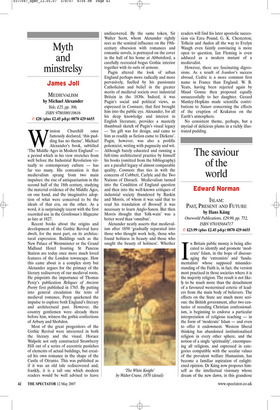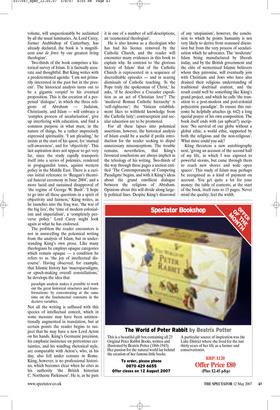The saviour of the world
Edward Norman
ISLAM: PAST, PRESENT AND FUTURE by Hans Küng Oneworld Publications, £29.99, pp. 752, ISBN 978185684717 ✆ £23.99 (plus £2.45 p&p) 0870 429 6655 In Britain public money is being allocated to identify and promote ‘moderate’ Islam, in the hope of discouraging the ‘extremists’ and ‘fundamentalists’ whose supposed misunderstanding of the Faith is, in fact, the version most practised in those societies where it is the majority religion. The result is not likely to be much more than the detachment of a favoured westernised coterie of leaders from the main body of believers. The effects on the State are much more serious: the British government, after two centuries of receding Christian confessionalism, is beginning to endorse a particular interpretation of religious teaching — in the form of ‘moderate’ Islam — and even to offer it endowment. Western liberal thinking has abandoned institutionalised religion in every other sphere, and the notion of a single ‘spirituality’, encompassing all religions, and expressed in categories compatible with the secular values of the prevalent welfare Humanism, has become a familiar aspiration of enlightened opinion. Dr Küng now proposes himself as the intellectual visionary whose dream of the new dawn, in this grandiose volume, will unquestionably be acclaimed by all the usual luminaries. As Lord Carey, former Archbishop of Canterbury, has already declared, the book is ‘a magnificent tour de force by our greatest living theologian’.
Two-thirds of the book comprises a historical survey of Islam. It is factually accurate and thoughtful. But Küng writes with a predetermined agenda: ‘I am not primarily interested in the past but in the present’. The historical analysis turns out to be a gigantic vorspiel to his eventual proposition. This is the creation of a perpetual ‘dialogue’, in which the three religions of Abraham — Judaism, Christianity, and Islam — will embrace a ‘complex process of secularisation’, give up interfering with education, and find a common purpose in what must, in the nature of things, be a rather imprecisely expressed spirituality. ‘I am pleading,’ he insists at the start of his quest, for ‘mutual self-awareness’, and for ‘objectivity’. This last aspiration does not appear to get very far, since the study rapidly transports itself into a series of polemics, rendered in propagandist tones, against western policy in the Middle East. There is a curious initial reference to ‘Reagan’s theatrical funeral ceremony in June 2004’, and a more lucid and sustained disapproval of ‘the regime of George W. Bush’. ‘I hope to go into all these questions in a spirit of objectivity and fairness,’ Küng writes, as he launches into the Iraq war, ‘the war of the big lies’, the ‘time of modern colonialism and imperialism’, a ‘completely perverse policy.’ Lord Carey might look again at what he has endorsed.
The problem the reader encounters is not in unravelling the polemical writing from the analysis of Islam, but in understanding Küng’s own prose. Like many theologians he employs opaque categories which remain opaque — a condition he refers to as ‘the joy of intellectual discourse’. Having observed, for example, that Islamic history has ‘macroparadigms, or epoch-making overall constellations,’ he develops the idea that
paradigm analysis makes it possible to work out the great historical structures and transformations: by concentrating at the same time on the fundamental constants in the decisive variables.
Not all the writing is suffused with this species of intellectual conceit, which in some measure may have been unintentionally augmented in translation, but at certain points the reader begins to suspect that he may have a new Lord Acton on his hands. Küng’s Germanic precision, his emphatic insistence on portentous certainties, and his windbag rhetorical style, are comparable with Acton’s, who, in his day, also fell under censure in Rome. Küng, however, is no professional historian, which becomes clear when he cites as his authority ‘the British historian C. Northcote Parkinson’. He is, as he puts it in one of a number of self-descriptions, an ‘ecumenical theologian’.
He is also known as a theologian who has had his licence removed by the Catholic Church, and the reader will encounter many evidences in this book to explain why. In contrast to ‘the glorious history of Islam’ that of the Catholic Church is represented in a sequence of discreditable episodes — and in searing dismissals of Catholic teaching. ‘Is the Pope truly the spokesman of Christ,’ he asks, ‘if he describes a Crusader expedition as an act of Christian love’? The ‘medieval Roman Catholic hierarchy’ is ‘self-righteous’; the ‘Vatican establishment likes to withhold knowledge from the Catholic laity’; contraception and secular education are to be promoted.
For all these lapses into polemical assertions, however, the historical analysis of Islam could be a useful if prolix introduction for the reader seeking to dispel unnecessary misconceptions. The trouble remains, nevertheless, that Küng’s favoured conclusions are always implicit in the teleology of his writing. Two-thirds of the way through these pages a section entitled ‘The Contemporaneity of Competing Paradigms’ begins, and with it Küng’s ideas about the grand emollient dialogue between the religions of Abraham. Opinions about this will divide along largely political lines. Despite Küng’s disavowal of any ‘utopianism’, however, the conclusion to which he points humanity is not very likely to derive from reasoned discussion but from the very process of secularisation which he advocates. The ‘moderate’ Islam being manufactured by liberals today, and by the British government and the elite of westernised Islamic believers whom they patronise, will eventually join with Christians and Jews who have also drained their religious understanding of traditional doctrinal content, and the result could well be something like Küng’s grand project, and which he calls ‘the transition to a post-modern and post-colonial polycentric paradigm’. To ensure this outcome he helpfully attaches (p. 642) a long special prayer of his own composition. The book itself ends with (an upbeat?) ascription: ‘No survival of our globe without a global ethic, a world ethic, supported by both the religious and the non-religious’. What more could you ask?
Küng threatens a new autobiography next, ‘giving an account of the second half of my life, in which I was exposed to powerful storms, but came through them to reach new shores and wide open spaces’. This study of Islam may perhaps be recognised as a kind of payment on account. You get quite a lot for your money: the table of contents, at the start of the book, itself runs to 15 pages. Never mind the quality; feel the width.











































































 Previous page
Previous page